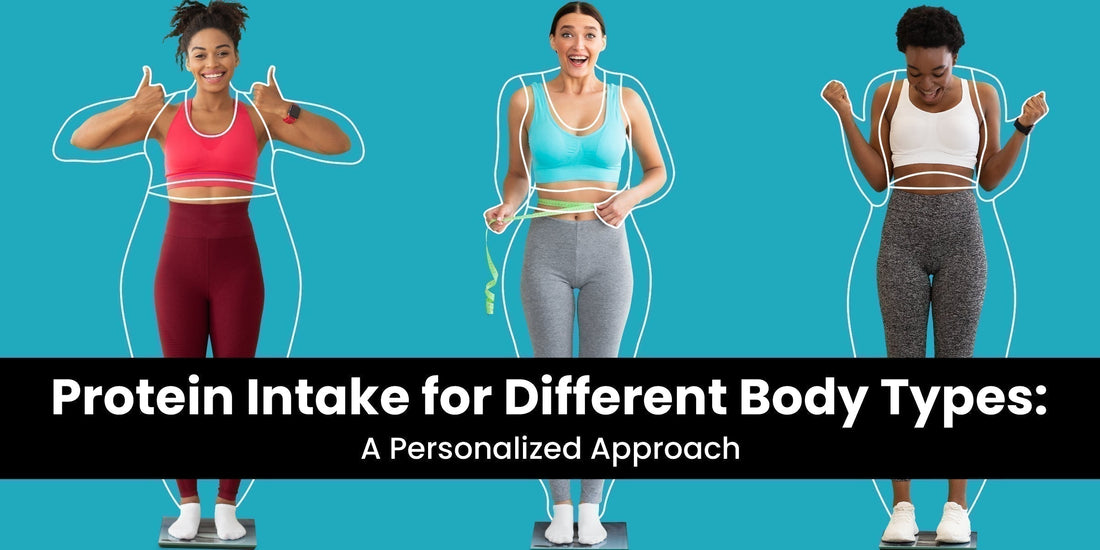
Protein Intake for Different Body Types: A Personalized Approach
byProtein is essential for muscle growth, fat loss, and overall health. But did you know that your body type affects how much protein you should consume? Understanding your somatotype—whether you're an ectomorph, mesomorph, or endomorph—can help you tailor your protein intake for optimal results.
Understanding the Three Body Types
Each body type processes nutrients and builds muscle differently. Here’s how they compare:
|
Body Type |
Characteristics |
Metabolism |
Protein Needs |
|
Ectomorph |
Lean, long limbs, struggles to gain weight |
Fast |
High (1.0 – 1.4g per lb of body weight) |
|
Mesomorph |
Naturally muscular, gains/loses weight easily |
Moderate |
Moderate-High (0.8 – 1.2g per lb) |
|
Endomorph |
Stocky, gains fat easily, struggles to lose weight |
Slow |
Moderate (0.7 – 1.0g per lb) |
Protein Recommendations Based on Body Type
1. Ectomorph (Hard Gainers)
Ectomorphs have a fast metabolism, making it difficult to gain muscle. To support growth:
- Protein Intake: 1.0 – 1.4g per lb of body weight
- Best Sources: Whey isolate, chicken, eggs, lean beef, fish, Greek yogurt.
- Meal Strategy: Eat every 3-4 hours to maintain muscle-building nutrients.
- Supplement Tip: Use whey protein post-workout and casein protein before bed for sustained muscle repair.
2. Mesomorph (Athletic Build)
Mesomorphs are naturally muscular and respond well to training. To maintain or enhance muscle:
- Protein Intake: 0.8 – 1.2g per lb of body weight
- Best Sources: Lean meats, dairy, plant-based proteins, fish, and protein shakes.
- Meal Strategy: Balanced meals with protein, healthy fats, and complex carbs.
- Supplement Tip: Post-workout whey protein isolate powder boosts recovery and muscle retention.
3. Endomorph (Easily Gains Weight)
Endomorphs store fat more easily, so protein intake should support muscle retention and fat loss:
- Protein Intake: 0.7 – 1.0g per lb of body weight
- Best Sources: Lean meats, fish, tofu, legumes, and whey isolate (low carb).
- Meal Strategy: Focus on high-protein, low-carb meals to prevent fat storage.
- Supplement Tip: Whey isolate is ideal due to its low-calorie, high-protein content.
How to Adjust Protein Based on Fitness Goals
✅ Muscle Gain: Increase protein intake by 10-20% and combine with strength training.
✅ Fat Loss: Maintain moderate protein levels while staying in a caloric deficit.
✅ Maintenance: Stick to your body-type-specific protein range to sustain muscle and energy levels.
Final Thoughts
Your body type matters when determining how much protein you need. Whether you're an ectomorph trying to bulk up, a mesomorph maintaining muscle, or an endomorph cutting fat, tailoring your intake ensures maximum results.
FAQs: Protein Intake & Body Types
1. Can I change my body type with diet and exercise?
Yes! While genetics play a role, training and nutrition can influence your physique.
2. How do I calculate my protein intake?
Multiply your body weight (lbs) by your recommended protein range (e.g., 1.0g per lb).
3. Is plant-based protein effective for muscle building?
Yes! Combine varied plant proteins (e.g., lentils, quinoa, tofu) to ensure a complete amino acid profile.
4. Should I take protein even on rest days?
Yes! Protein is needed daily for muscle repair and maintenance.
5. What’s the best protein supplement for fat loss?
Whey protein isolate is ideal due to its high protein content and low calories.








